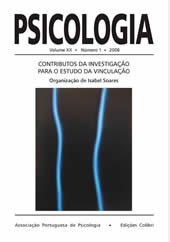Attachment and significant relationships' quality during pregnancy
DOI:
https://doi.org/10.17575/rpsicol.v20i1.378Keywords:
-Abstract
This study is aimed to investigate the quality of the pregnant woman’s attachment and significant relationships during pregnancy. More precisely it intends (1) to determine social and demographic characteristics as well as previous conditions of existence that may predict an (in)secure attachment style (2) to estimate the attachment style’s impacto n the quality of the relationship and support by the partner and another significant person, during pregnancy. A sample of 130 women (66 adolescents and 64 adults) was evaluated in the last trimester of gestation on the attachment style and on the quality of the relationship and support from the partner and another significant person (on the basis of Attachment Style Interview, ASI, Bifulco, Figueiredo, Guedeney, Gorman, Hays et al., 2004; Bifulco, Moran, Ball & Bernazzani, 2002a; Bifulco, Moran, Ball & Lillie, 2002b). The sample was collected at the Júlis Dinis Maternity Hospital (Porto, Portugal) and is very heterogeneous regarding social and demographic characteristics, such as: age, educational level, marital status, occupational status and family unit, though i tis mainly composed of primiparous pregnant. The results showed that the pregnant childhood parental divorce/separation and presente unemployment predict an insecure attachment style, anda n association between teen pregnancy anda n dismissing attachment style. The results also showed that an insecure attachment style predicts a worse relationship with the partner, as well as a worse relationship with the significant other, principally the presence of discordant relationships with the partner and of apathetic relationships with the significant other. Emmeshed strategies affects the relationship with the partner (in aspects as less trust, poor emotional support and more negative interaction), but not with the significant other (in aspects as less shared activities and poor positive nteraction), bt not with the partner, and fearful startegies affect the relationship with the partner (in aspects as poor attachment) and the relationship with the significant other (in aspects as less trust). One concludes according to attachment theory that previous and presente adverse conditions of existence increase attachment insecurity and that attachment style interferes in the quality of the relationship with the partner and with significant others, namely in the pregnant ability to seek support.


